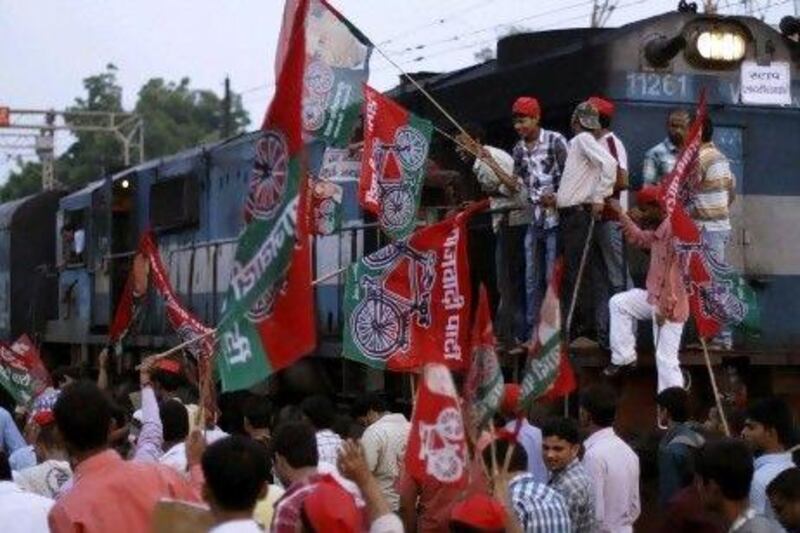NEW DELHI AND MUMBAI // Shop keepers, truck drivers and labourers protested by blocking roads and trains yesterday against a government decision to open India's retail sector to foreign companies and cut fuel subsidies.
Schools, businesses and government offices were shut in many parts of India during the one-day protest backed by several political parties, including the opposition Bharatiya Janata Party (BJP) and smaller, regional parties from across the political spectrum.
The strike was called to oppose the economic reform package announced last week by Prime Minister Manmohan Singh's Congress-led coalition government. The reforms opened up the country's enormous retail sector to foreign competitors.
"We don't want the country to be run by two or three big companies," said Bimal Bhuta, 35, who runs a corner shop in Mumbai. "What happens to the local people? The way India does business is very different - the indigenous way of working is better. We don't want the culture to be destroyed."
The government also announced a reduction in massive subsidies for diesel fuel and cooking gas. Diesel prices went up by five rupees (34 fils), or 12 per cent.
"When you increase the price of fuel, the price of everything goes up," said Sri Lal Chand, 58, a wholesale distributor of grains in Chandni Chowk, one of Delhi's biggest and oldest wholesale markets.
"The lorry driver will pay thousands more in fuel costs for transporting my grains to Delhi. I will then have to charge my buyers to recover the costs," said Mr Chand, who joined a rally of traders in Delhi.
In some states, such as opposition-ruled Gujarat, the strike was widely followed. In other regions, including the main cities of New Delhi and Mumbai, the effect of the protests was scattered. Nevertheless, the Confederation of Indian Industry estimated the country might have lost as much as 125 billion rupees (Dh8.46bn) in production and trade.
Protesters squatted on railway tracks, camped out at bus depots and forced shops to down their shutters across the country.
With an estimated 50 million corner shops and 220 million people dependent on them for their livelihoods, according to the Confederation of All India Traders, small retailers represent a huge political constituency. India, it is said, is a nation of shopkeepers.
"Multinational companies will destroy the economic and social fabric of the country and will adversely effect traders, transporters, farmers and other sections of retail trade," said Praveen Khandelwal, the trader confederation's secretary general.
Kolkata, Bangalore and Chennai were among cities most affected by the strike, with the majority of shops, factories, schools and offices shut down for the day.
In Bangalore, the country's technology hub, most of the 3,500 employees at US chipmaker Intel and the 10,000 workers at Cisco Systems, another US company, were asked to work from home, a company spokesmen said. Infosys and Wipro gave staff the day off, but will ask them to work tomorrowinstead.
Train services were disrupted in Kolkata, where on Tuesday evening, Mamata Banerjee, the leader of the Trinamool Congress party, announced she would withdraw her support form the coalition government today over the "anti-people" reforms.
However, the finance minister, Palaniappan Chidambaram, said the reforms would stand.
"It's a very difficult decision for the government. We have tried to assure everybody that there was no other way except to take that decision to keep the economy on track," Ambika Soni, the information minister, said yesterday.
In parts of Uttar Pradesh, railway tracks were blocked by protesters, where they burnt effigies of the prime minister and held up signs that read "Take Back Wal-Mart" in Hindi.
In a signal that the Congress alliance was at risk of losing more support, however, many of the protests in Uttar Pradesh were led by the Samajwadi Party, which has previously supported the government but has been extremely critical of the reforms.
After Trinamool left the coalition, Congress was left with a minority government dependent on the support in parliament of either the Samajwadi Party or the Bahujan Samaj Party (BSP) from Uttar Pradesh. Samajwadi said it would meet last night to decide whether to continue supporting the government. The BSP said it would decide next month what action to take. The party's head, Mayawati, who goes by one name, said her supporters did not join the strike yesterday.
In Mumbai and Delhi, a majority of corner stores and markets remained open and government buses operated after local parties said they would not take part in the strike.
Bhushan Kumar, who runs the Nilli General Store in Delhi's New Friends Colony market pointed to the crammed shop, already full of products with international brands such as Pepsi and Nestle.
"They [large foreign stores] will sell the same products you see in my store," said Mr Kumar. "But they will arrange them nicely and put them under bright lights to entice the customer. At first, customers will like that but I am sure sooner than later they will return to the convenience of their local, neighbourhood shops because we provide services the big, foreign stores cannot."
Mr Kumar allows his long-standing customers a line of credit, where bills are paid monthly. As well as free home delivery.
Ram Lal, who sells vegetables from a trolley every morning and evening in Delhi, remained optimistic about his livelihood.
"With all these power cuts, how is a housewife going to store two weeks' of groceries in her fridge?" Mr Lal said.
sbhattacharya@thenational.ae
rbundhun@thenational.ae
Suryatapa Bhattacharya reported from New Delhi. Rebecca Bundhun reported from Mumbai
* With additional reporting by Reuters and Associated Press





